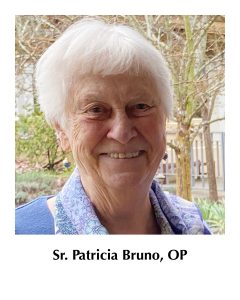- All
- Wisdom
- We Stand on Their Shoulders
- Vocation
- Uncategorized
- Stories Seldom Heard
- Spirituality
- Social Justice
- Prayer
- Peace
- Oneness
- Love
- Letting Go
- Lent
- Joy
- Inspirational Images
- Hope / Healing
- Holy Week
- Gratefulness
- God's Presence
- General News Stories
- Forgiveness
- Finding God
- Faith
- Easter
- Dominican Saints
- Discipleship
- Courage
- Christmas
- Catholic Sisters Week
- Care of the Earth
- Blessing
- Beauty
- Advent
- #justiceOPportunity
Psalm 116 (Selected passages)
Sr. Patricia Bruno, OP

279th Edition October 2022
“I love! For you Oh God, have heard my voice and bent down to listen to me when I call. Death’s cords were tightening around me, the nooses of Sheol: distress and anguish griped me. I am greatly afflicted. I invoked the name of God. “Oh God, rescue me!”
The death of the devout costs God – dearly. Oh God, I am your servant, the child of a pious woman – You undo my fetters.
God is righteous and merciful, our God is tenderhearted, God defends the simple; God saved me when I was brought to my knees.
What return can I make to God for all the good done to me? I will offer the cup of salvation to my savior, a thanksgiving sacrifice invoking the name of God. I will pay what I vowed to God, may the whole nation be present.”
 Before Covid, I volunteered to be a substitute manager for our congregation’s affordable housing units in San Francisco. While I was there, I met a middle-aged woman who was very friendly and a resident of the apartment building. I will name her Martha. As she was leaving the lobby, I complimented her on how lovely she looked. She told me her daughter was getting married in two weeks. She was meeting friends who were going to help with the wedding arrangements. Then she said, “My daughter and I have invited three of your Dominican sisters to the wedding.” She named the sisters and added, “They’re great women!”
Before Covid, I volunteered to be a substitute manager for our congregation’s affordable housing units in San Francisco. While I was there, I met a middle-aged woman who was very friendly and a resident of the apartment building. I will name her Martha. As she was leaving the lobby, I complimented her on how lovely she looked. She told me her daughter was getting married in two weeks. She was meeting friends who were going to help with the wedding arrangements. Then she said, “My daughter and I have invited three of your Dominican sisters to the wedding.” She named the sisters and added, “They’re great women!”
It was a very revealing statement. She knew I would understand. You see, the three sisters she named are all involved with the prison system. One of the sisters visits the San Francisco Women’s Prison and counsels them. She helps direct them to resources so when they are released they can get established more quickly. The second sister manages a Safe House – a home where women who have been incarcerated for drugs/prostitution can be assigned by a judge. While the women are living in the house it is recognized as part of their jail time. The house is professionally managed and the staff helps the women begin the process of changing their lives. The third sister Martha mentioned interviews potential residents at our affordable housing units where Martha now lives.
Martha told me a lot in one sentence. I could tell she was proud of the changes she had made in her life. Sometimes we hear about conversions that take place in prison. Often, we doubt those stories because we know how hard it is for us to change even a small part of our lives. Change is hard. But then we meet someone like Martha and there’s no denying the power of God. Incarceration can change people. Those who feel “death cords tightening around” them can find a way out.
But we don’t have to be imprisoned by steel bars to feel the dread, isolation, or agony of which the psalmist speaks. The cords of death have many faces: fear, doubt, jealousy, and selfishness. Even when we have faith, as the psalmist does, we have heard ourselves say, “I am greatly afflicted.” Our child is diagnosed with an unusual disease and our whole family feels the pain. The news of layoffs at work affects everyone in the office. Everyone is on edge not just because they fear the loss of their job, but because they are concerned for those who have lost their jobs. Our lives are connected. Our joys and sorrows affect those we love and those with whom we associate.
The psalmist uses strong language to describe her/his pain. It’s not just someone who is having a bad day or some minor troubles. “No one can be relied on. I am sorely afflicted.” The psalm expresses serious pain. In fact, psychologists tell us that affliction is a particular type of suffering. It’s described as a place of darkness and isolation that can deaden us spiritually, morally, and physically. It’s a suffering that haunts us night and day. It is one that literally can worry us sick. If we stay in this afflicted state for a long time it can overpower us.
We often hear ourselves say “People have a lot to deal with.” Perhaps we have even said that about ourselves. When we face difficult moments, we, like the psalmist, often question our faith and God’s promise to be always with us even through hard times.
In those moments Psalm 116 would be a good psalm to pray because it gives us powerful and compassionate images of God. God “bent down to listen to me when I called.” God is not aloof or far off. Like a loving mother or father, God bends down to where we are. Lovingly God listens to us. We hear the depth of God’s love. God is merciful and tenderhearted. “The death of the devout costs God dearly.” This “cost” has nothing to do with finances and everything to do with love. It costs God to see us suffering. In other words, God feels our grief. God grieves with us.
Who among us would not take on the affliction from our child or spouse? Who among us would not give our life for a loved one? If we, who are sometimes rather halting in our compassion and fumbling in our responses to one another can do that, how much more can we be assured that God will not abandon us? God is with us when we feel most alone and in need of help. Like a loving spouse or a dear friend, God weeps with us in the small and large losses of our lives. Others might grow weary of hearing our cries, but God never tires, never gets distracted. God is as attentive to us as God was to Jesus on the cross.
Often, we can’t take away another person’s pain. But there are things we can do to help someone who feels isolated, depressed, or deeply discouraged. We can stand with them. Let them know they are not alone. We can help them break loose from the cords that hold them captive as the sisters did for Martha. They supported her and encouraged her while she made life-giving choices. She would be the first to say, like the psalmist, that during that time of transition she needed more than just human support. She, too, turned to God: the God who bends down, listens, rescues, saves, and treats us kindly.
In spite of the difficulties that are mentioned, Psalm 116 is a prayer of thanksgiving. God is righteous, merciful, and tenderhearted. God defends the little ones and is faithful to the vulnerable. Every part of the psalmist has been saved. “God has rescued my eyes from tears and my feet from stumbling. I will walk in the land of the living.” But there’s more to this meditation. The change has not only been in the circumstances that have encompassed the psalmist’s life, there has also been an interior change. With a heart filled with gratitude, the psalmist asks: “What return can I make to God for all the good God has done to me?” The good is not done “for me”, but “to me,” indicating a change of heart and a deepening of trust. Circumstances might remain the same, but when we are open to God’s power working in our lives, our hearts and minds can come to new understandings. The psalmist recognizes the change within her/himself and desires to give something back to God as a sign of gratitude.
We, like the psalmist, know it is impossible to thank God sufficiently. So, the question that the Psalmist asks is an appropriate one for us too. “What return can I make to God for all the good God has done to me?” It’s difficult to go to Mass every day, but perhaps we can make a simple gesture each day as we end our morning and evening prayer. We can take a special glass or cup containing juice or wine and raise it as an offering to God: a cup that holds both the joys and sorrows, not only of our lives but also those of the world. The raising of the cup in silence is a symbolic gesture that represents our gratitude and concern for one another. It is a way of uniting us with all those who continue to struggle to live good lives. It is a gesture that cannot be forgotten easily in the business of the day. When done on a daily basis, it is a strong gesture that unites our joys and sufferings with Christ and renews our commitment to continue to reach out to those who are in need of support.
